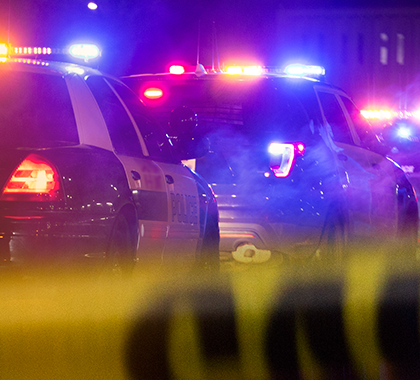In 2020 and 2021, law enforcement officers faced an unprecedented level of scrutiny and criticism, especially in the wake of the death of George Floyd, an African American man who died in May 2020 while in police custody in Minneapolis. Floyd’s death sparked months of protests, hundreds of which resulted in substantial property damage, looting, and even violence.[1],[2]
Floyd’s death also brought the so-called “Defund the Police” (DTP) movement into the national spotlight. Although the views of those who identify with Defund the Police vary, nearly all supporters of DTP, including some members of Congress, believe police budgets and staffing should be reduced substantially.[3],[4]
In 2020 and early 2021, numerous efforts to cut police funding or to stop expected budgetary increases were successful, including in cities such as Minneapolis, New York City, and Oakland, among many others. In many cases, however, these decisions were later partially reversed following dramatic increases in crime.[5]
Although alleged police criminal activity and violent crime rates are usually the focuses of the Defund the Police debate, another important issue deserves consideration from policymakers thinking about making changes to police budgets: the dramatic rise in the number of felonious killings of law enforcement officers that has occurred over the past year.
For decades, the Federal Bureau of Investigation (FBI) has published an annual report as part of its Law Enforcement Officers Killed and Assaulted (LEOKA) Program, as well as monthly updates that allow the public and law enforcement agencies to track how statistics related to police fatalities—both accidental and those resulting from a felony—compared to previous periods.[6]
In 2021, 73 law enforcement officers were feloniously killed, compared to 46 in 2020 and 48 in 2019. (See Table 1 in the PDF included at the top of this page.)
Further, based on LEOKA’s historical records, the number of felonious deaths of police and other law enforcement officers in 2021 was the highest recorded since 1995, as well as the first time since 2011 the number of felonious killings of police surpassed 70.
Although more data will need to be provided by the FBI and local agencies before the dramatic increase in felonious police killings can be fully understood, the LEOKA data seem to indicate one of the primary explanations for the increase is a sharp rise in the number of ambushes and unprovoked attacks on police. (See Table 1 in the PDF included at the top of this page.)
According to the LEOKA Training Manual, an “ambush” is a form of entrapment and premeditation. It’s further described as a “Situation where an unsuspecting officer was targeted or lured into danger as the result of conscious consideration and planning by the offender.”[7]
An “unprovoked attack” is “An attack on an officer that, at the time of the incident, was not prompted by official contact between the officer and the offender.”[8]
In 2021, 32 police officers were feloniously killed in an ambush or unprovoked attack, compared to 10 such killings in 2020 and seven in 2019. A further review of LEOKA’s annual reports available online reveals the number of ambush/unprovoked killings of law enforcement in 2021 far exceeded all previously recorded figures, dating back to at least 1987—the earliest data available in annual reports published on the FBI’s LEOKA website.[9]
As the data show, law enforcement officers are facing exceptionally dangerous circumstances. Rather than decreasing funding in the midst of an unprecedented wave of attacks on police and other law enforcement agents, policymakers should—alongside implementing commonsense reforms of police practices and enhancing accountability—strongly consider passing measures to bolster police department budgets, as well as launch detailed investigations into the reasons behind the disturbing increase in the number of law enforcement officers feloniously killed in 2021.
[1] See Mike Gonzalez, “For Five Months, BLM Protestors Trashed America’s Cities. After the Election, Things May Only Get Worse,” heritage.org, The Heritage Foundation, Nov. 6, 2020, https://www.heritage.org/progressivism/commentary/five-months-blm-protestors-trashed-americas-cities-after-the-election
[2] Roudabeh Kishi and Sam Jones, “Demonstrations and Political Violence in America: New Data for Summer 2020,” Armed Conflict Location & Event Data Project, September 3, 2020, https://acleddata.com/2020/09/03/demonstrations-political-violence-in-america-new-data-for-summer-2020
[3] See, for example, “The Time Has Come to Defund the Police,” m4bl.org, The Movement for Black Lives, accessed January 4, 2022, https://m4bl.org/defund-the-police
[4] Carl Campanile, “AOC Defends ‘Defund the Police’ Mantra after Dem Losses,” New York Post, November 12, 2020, https://nypost.com/2020/11/12/aoc-defends-defund-the-police-mantra-after-dem-losses
[5] Zusha Elinson, Dan Frosch, and Joshua Jamerson, “Cities Reverse Defunding the Police Amid Rising Crime,” The Wall Street Journal, May 26, 2021, https://www.wsj.com/articles/cities-reverse-defunding-the-police-amid-rising-crime-11622066307
[6] According to the FBI, the LEOKA “publishable data pertains to felonious deaths, accidental deaths, and assaults of duly sworn city, university and college, county, state, tribal, and federal law enforcement officers who, at the time of the incident, met the following criteria: Wore/carried a badge (ordinarily); Carried a firearm (ordinarily); Were duly sworn and had full arrest powers; Were members of a law enforcement agency; Were acting in an official capacity, whether on or off duty, at the time of the incident; If killed, the deaths were directly related to the injuries received during the incidents.” For more information, see Federal Bureau of Investigation, “Law Enforcement Officers Killed and Assaulted (LEOKA) Program,” last accessed January 4, 2022, https://www.fbi.gov/services/cjis/ucr/leoka
[7] Jeffrey A. Daniels et al., Ambushes and Unprovoked Attacks: Assaults on Our Nation’s Law Enforcement Officers, Criminal Justice Information Services Division of the FBI and West Virginia University, May 2019, https://www.leonearmiss.org/wp-content/uploads/2020/11/FBI-AmbushesUnprovokedAttacks.pdf
[8] Ibid.
[9] The FBI reports LEOKA has been in publication since 1972.





